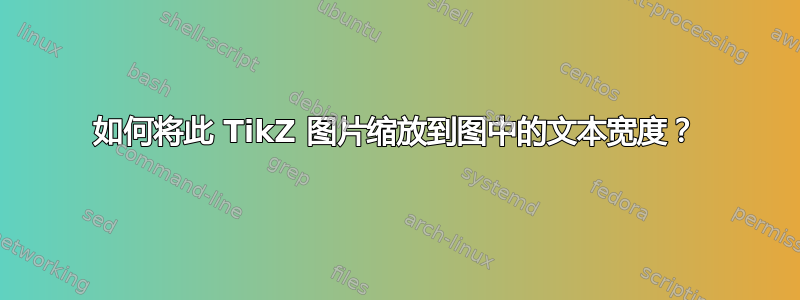
我有一张包含节点、矩阵和一些其他元素的 TikZ 图片。我有点不知道如何缩放它以适合图中的文本宽度。使用会resizebox导致奇怪的渲染错误,并且 TikZ 图片scale参数似乎没有任何作用。我该怎么做?
\documentclass[american, a4paper]{report}
\usepackage{graphicx}
\usepackage{pgf}
\usepackage{tikz}
\usepackage{pgfplots}
\usetikzlibrary{calc}
\usetikzlibrary{arrows, shapes}
\usetikzlibrary{arrows, automata}
\usetikzlibrary{positioning}
\usepackage{subfigure}
\usepackage{float}
%\usepackage{gantt}
\pgfdeclarelayer{background}
\pgfdeclarelayer{foreground}
\pgfsetlayers{background,main,foreground}
\usepackage{pdflscape}
\usepackage{amsmath}
\usepackage{gensymb}
\usepackage{bm}
\usepackage{cancel}
\usepackage{mathtools}
\usetikzlibrary{fit, arrows, calc, positioning}
\DeclarePairedDelimiter{\ceil}{\lceil}{\rceil}
\DeclarePairedDelimiter{\floor}{\lfloor}{\rfloor}
\usepackage{feynmp}
\usepackage{feynmp-auto}
\unitlength=1.00 mm
\usepackage{bbding}
\usepackage[hidelinks]{hyperref}
\usepackage{verbatim}
\usepackage{fancyvrb}
\usepackage{ragged2e}
\usepackage{lipsum}
\usepackage{multicol}
\usepackage{multirow}
\usepackage{babel}
\usepackage{datetime}
\usepackage{siunitx}
\usepackage{lineno}
\usepackage{attachfile}
\usepackage{fancyhdr}
\usepackage{titlesec}
\newcommand{\mathunit}[2]{#1\,\si{#2}}
\usepackage{parskip}
\begin{document}
\begin{figure}[H]
\tikzstyle{particleblue}=[
rectangle,
thick,
draw=black,
fill=blue!20,
minimum size=80pt
]
\tikzstyle{particlegreen}=[
rectangle,
thick,
draw=black,
fill=green!20,
minimum size=80pt
]
\tikzstyle{particlered}=[
rectangle,
thick,
draw=black,
fill=red!20,
minimum size=80pt
]
\tikzstyle{particleyellow}=[
rectangle,
thick,
draw=black,
fill=yellow!40,
minimum size=80pt
]
\tikzstyle{backgroundblue}=[
rectangle,
fill=blue!10,
inner sep=0.2cm
]
\tikzstyle{backgroundgreen}=[
rectangle,
fill=green!10,
inner sep=0.2cm
]
\tikzstyle{backgroundred}=[
rectangle,
fill=red!10,
inner sep=0.2cm
]
\tikzstyle{backgroundyellow}=[
rectangle,
fill=yellow!40,
inner sep=0.2cm
]
\newcommand\particleblue[5]{% {label}{name}{mass}{charge}{spin}
\node (#1) [particleblue]{
\Huge${\boldsymbol{#2}}$};
\node[below=11pt]{%
\tiny
\begin{tabular}{@{}p{17pt}p{43pt}@{}}
Mass:&${#3}$\\
Charge:&${#4}$\\
Spin:&${#5}$
\end{tabular}
};
}
\newcommand\particlegreen[5]{% {label}{name}{mass}{charge}{spin}
\node (#1) [particlegreen]{
\Huge${\boldsymbol{#2}}$};
\node[below=11pt]{%
\tiny
\begin{tabular}{@{}p{17pt}p{43pt}@{}}
Mass:&${#3}$\\
Charge:&${#4}$\\
Spin:&${#5}$
\end{tabular}
};
}
\newcommand\particlered[5]{% {label}{name}{mass}{charge}{spin}
\node (#1) [particlered]{
\Huge${\boldsymbol{#2}}$};
\node[below=11pt]{%
\tiny
\begin{tabular}{@{}p{17pt}p{43pt}@{}}
Mass:&${#3}$\\
Charge:&${#4}$\\
Spin:&${#5}$
\end{tabular}
};
}
\newcommand\particleyellow[5]{% {label}{name}{mass}{charge}{spin}
\node (#1) [particleyellow]{
\Huge${\boldsymbol{#2}}$};
\node[below=11pt]{%
\tiny
\begin{tabular}{@{}p{17pt}p{43pt}@{}}
Mass:&${#3}$\\
Charge:&${#4}$\\
Spin:&${#5}$
\end{tabular}
};
}
\begin{tikzpicture}[>=latex,text depth=0.00ex]
% elements in a matrix
\matrix[row sep=0.5cm,column sep=0.5cm, nodes={align=left}]{
\particleblue{u}{u}{2.3\,\si{MeV/c^2}}{2/3}{1/2}&
\particleblue{c}{c}{1.275\,\si{GeV/c^2}}{2/3}{1/2}&
\particleblue{t}{t}{173.07\,\si{GeV/c^2}}{2/3}{1/2}&
\particlered{g}{g}{0}{0}{1}&
\particlegreen{H}{H}{126\,\si{GeV/c^2}}{0}{0}&
\\
\particleblue{d}{d}{4.8\,\si{MeV/c^2}}{-1/3}{1/2}&
\particleblue{s}{s}{95\,\si{MeV/c^2}}{-1/3}{1/2}&
\particleblue{b}{b}{4.18\,\si{GeV/c^2}}{-1/3}{1/2}&
\particlered{gamma}{\gamma}{0}{0}{1}&
\\
\particleyellow{e}{e}{0.511\,\si{MeV/c^2}}{-1}{1/2}&
\particleyellow{mu}{\mu}{105.7\,\si{MeV/c^2}}{-1}{1/2}&
\particleyellow{tau}{\tau}{1.777\,\si{GeV/c^2}}{-1}{1/2}&
\particlered{Z}{Z}{91.2\,\si{GeV/c^2}}{0}{1}&
\\
\particleyellow{nu_e}{\nu_{e}}{<2.2\,\si{eV/c^2}}{0}{1/2}&
\particleyellow{nu_mu}{\nu_{\mu}}{0.17\,\si{MeV/c^2}}{0}{1/2}&
\particleyellow{nu_tau}{\nu_{\tau}}{15.5\,\si{MeV/c^2}}{0}{1/2}&
\particlered{W}{W}{80.4\,\si{GeV/c^2}}{\pm{1}}{1}&
\\
};
% background rectanges
\begin{pgfonlayer}{background}
\node [
backgroundblue,
fit=(u) (b)
]{};
\node [
backgroundyellow,
fit=(e) (nu_tau)
]{};
\node [
backgroundred,
fit=(g) (W)
]{};
\node [
backgroundgreen,
fit=(H)
]{};
\end{pgfonlayer}
\end{tikzpicture}
\caption{Standard Model fundamental particles in their mass eigenstates, with matter generations distinguished by column}
\label{figure:Standard_Model_particles}
\end{figure}
\end{document}
答案1
你还有更多的可能性:
- 考虑epR8GaYuh评论(因此质量、电荷和自旋的数据将变得非常小,以至于需要放大镜才能阅读)
- 全局更改页面布局,例如添加
\usepackage{geometry}序言 - 使用包
pagechange及其宏等方法局部改变图形环境\adjustwidth<+{}{-\dimexpr\marginparwidth+\marginparsep\relax} - 重新设计你的身材(让所有元素变得更小
第二种和第四种可能性的组合给出:
MWE(删除所有不相关的包和 tikz 库并添加缺失的包和替换贬值的包并调整图像元素/样式后\tikzstyle)\tikzset是:
\documentclass{report}
\usepackage{geometry}
\usepackage{showframe}
\usepackage{tikz}
\usepackage{pgfplots}
\usetikzlibrary{calc}
\usetikzlibrary{arrows, fit, positioning}
\pgfdeclarelayer{background}
\pgfdeclarelayer{foreground}
\pgfsetlayers{background,main,foreground}
\usepackage{amsmath}
\usepackage{siunitx}
\begin{document}
\begin{figure}
\setlength\tabcolsep{4pt}
\tikzset{
base/.style = {shape=rectangle,
draw, thick,
minimum size=75pt,
inner sep=2pt,
outer sep=0pt},
particleblue/.style = {base, fill=blue!20},
particlegreen/.style = {base, fill=green!20},
particlered/.style = {base, fill=red!20},
particleyellow/.style = {base, fill=yellow!40},
%
basefit/.style = {shape=rectangle,
inner sep=2pt
outer sep=0pt},
backgroundblue/.style = {fill=blue!10},
backgroundgreen/.style = {fill=green!10},
backgroundred/.style = {fill=red!10},
backgroundyellow/.style = {fill=yellow!40}
} % end of tikzset
\newcommand\particleblue[5]{% {label}{name}{mass}{charge}{spin}
\node (#1) [particleblue]{
\Huge${\boldsymbol{#2}}$};
\node[below=11pt]{%
\tiny
\begin{tabular}{@{}p{17pt}p{42pt}@{}}
Mass: &${#3}$\\
Charge:&${#4}$\\
Spin: &${#5}$
\end{tabular}
};
}
\newcommand\particlegreen[5]{% {label}{name}{mass}{charge}{spin}
\node (#1) [particlegreen]{
\Huge${\boldsymbol{#2}}$};
\node[below=11pt]{%
\tiny
\begin{tabular}{@{}p{17pt}p{42pt}@{}}
Mass: &${#3}$\\
Charge:&${#4}$\\
Spin: &${#5}$
\end{tabular}
};
}
\newcommand\particlered[5]{% {label}{name}{mass}{charge}{spin}
\node (#1) [particlered]{
\Huge${\boldsymbol{#2}}$};
\node[below=11pt]{%
\tiny
\begin{tabular}{@{}p{17pt}p{42pt}@{}}
Mass: &${#3}$\\
Charge:&${#4}$\\
Spin: &${#5}$
\end{tabular}
};
}
\newcommand\particleyellow[5]{% {label}{name}{mass}{charge}{spin}
\node (#1) [particleyellow]{
\Huge${\boldsymbol{#2}}$};
\node[below=11pt]{%
\tiny
\begin{tabular}{@{}p{17pt}p{42pt}@{}}
Mass: &${#3}$\\
Charge:&${#4}$\\
Spin: &${#5}$
\end{tabular}
};
}
\begin{tikzpicture}[>=latex]
% elements in a matrix
\matrix[row sep=9pt,column sep=8pt, nodes={align=left}]{
\particleblue{u}{u}{2.3\,\si{MeV/c^2}}{2/3}{1/2}&
\particleblue{c}{c}{1.275\,\si{GeV/c^2}}{2/3}{1/2}&
\particleblue{t}{t}{173.07\,\si{GeV/c^2}}{2/3}{1/2}&
\particlered{g}{g}{0}{0}{1}&
\particlegreen{H}{H}{126\,\si{GeV/c^2}}{0}{0}&
\\
\particleblue{d}{d}{4.8\,\si{MeV/c^2}}{-1/3}{1/2}&
\particleblue{s}{s}{95\,\si{MeV/c^2}}{-1/3}{1/2}&
\particleblue{b}{b}{4.18\,\si{GeV/c^2}}{-1/3}{1/2}&
\particlered{gamma}{\gamma}{0}{0}{1}&
\\
\particleyellow{e}{e}{0.511\,\si{MeV/c^2}}{-1}{1/2}&
\particleyellow{mu}{\mu}{105.7\,\si{MeV/c^2}}{-1}{1/2}&
\particleyellow{tau}{\tau}{1.777\,\si{GeV/c^2}}{-1}{1/2}&
\particlered{Z}{Z}{91.2\,\si{GeV/c^2}}{0}{1}&
\\
\particleyellow{nu_e}{\nu_{e}}{<2.2\,\si{eV/c^2}}{0}{1/2}&
\particleyellow{nu_mu}{\nu_{\mu}}{0.17\,\si{MeV/c^2}}{0}{1/2}&
\particleyellow{nu_tau}{\nu_{\tau}}{15.5\,\si{MeV/c^2}}{0}{1/2}&
\particlered{W}{W}{80.4\,\si{GeV/c^2}}{\pm{1}}{1}&
\\
};
% background rectanges
\begin{pgfonlayer}{background}
\node [
backgroundblue,
fit=(u) (b)
]{};
\node [
backgroundyellow,
fit=(e) (nu_tau)
]{};
\node [
backgroundred,
fit=(g) (W)
]{};
\node [
backgroundgreen,
fit=(H)
]{};
\end{pgfonlayer}
\end{tikzpicture}
\caption{Standard Model fundamental particles in their mass eigenstates, with matter generations distinguished by column}
\label{figure:Standard_Model_particles}
\end{figure}
\end{document}
如果 代替Mass,Charge并且Spin使用 短度M,C并且S以及其含义在标题中解释,则可以进一步减小图像大小。这可以进一步减少节点。
答案2
如果你尝试将其tikzpicture放入任何盒子中,就会发生奇怪的事情。所以我改用lrbox环境。
\documentclass[american, a4paper]{report}
\usepackage{graphicx}
\usepackage{pgf}
\usepackage{tikz}
\usepackage{pgfplots}
\usetikzlibrary{calc}
\usetikzlibrary{arrows, shapes}
\usetikzlibrary{arrows, automata}
\usetikzlibrary{positioning}
\usepackage{subfigure}
\usepackage{float}
%\usepackage{gantt}
\pgfdeclarelayer{background}
\pgfdeclarelayer{foreground}
\pgfsetlayers{background,main,foreground}
\usepackage{pdflscape}
\usepackage{amsmath}
\usepackage{gensymb}
\usepackage{bm}
\usepackage{cancel}
\usepackage{mathtools}
\usetikzlibrary{fit, arrows, calc, positioning}
\DeclarePairedDelimiter{\ceil}{\lceil}{\rceil}
\DeclarePairedDelimiter{\floor}{\lfloor}{\rfloor}
\usepackage{feynmp}
\usepackage{feynmp-auto}
\unitlength=1.00 mm
\usepackage{bbding}
\usepackage[hidelinks]{hyperref}
\usepackage{verbatim}
\usepackage{fancyvrb}
\usepackage{ragged2e}
\usepackage{lipsum}
\usepackage{multicol}
\usepackage{multirow}
\usepackage{babel}
\usepackage{datetime}
\usepackage{siunitx}
\usepackage{lineno}
\usepackage{attachfile}
\usepackage{fancyhdr}
\usepackage{titlesec}
\newcommand{\mathunit}[2]{#1\,\si{#2}}
\usepackage{parskip}
\newsavebox{\tempbox}
\begin{document}
\begin{figure}[H]
\begin{lrbox}{\tempbox}
\tikzstyle{particleblue}=[
rectangle,
thick,
draw=black,
fill=blue!20,
minimum size=80pt
]%
\tikzstyle{particlegreen}=[
rectangle,
thick,
draw=black,
fill=green!20,
minimum size=80pt
]%
\tikzstyle{particlered}=[
rectangle,
thick,
draw=black,
fill=red!20,
minimum size=80pt
]%
\tikzstyle{particleyellow}=[
rectangle,
thick,
draw=black,
fill=yellow!40,
minimum size=80pt
]%
\tikzstyle{backgroundblue}=[
rectangle,
fill=blue!10,
inner sep=0.2cm
]%
\tikzstyle{backgroundgreen}=[
rectangle,
fill=green!10,
inner sep=0.2cm
]%
\tikzstyle{backgroundred}=[
rectangle,
fill=red!10,
inner sep=0.2cm
]%
\tikzstyle{backgroundyellow}=[
rectangle,
fill=yellow!40,
inner sep=0.2cm
]%
\newcommand\particleblue[5]{% {label}{name}{mass}{charge}{spin}
\node (#1) [particleblue]{
\Huge${\boldsymbol{#2}}$};
\node[below=11pt]{%
\tiny
\begin{tabular}{@{}p{17pt}p{43pt}@{}}
Mass:&${#3}$\\
Charge:&${#4}$\\
Spin:&${#5}$
\end{tabular}
};
}%
\newcommand\particlegreen[5]{% {label}{name}{mass}{charge}{spin}
\node (#1) [particlegreen]{
\Huge${\boldsymbol{#2}}$};
\node[below=11pt]{%
\tiny
\begin{tabular}{@{}p{17pt}p{43pt}@{}}
Mass:&${#3}$\\
Charge:&${#4}$\\
Spin:&${#5}$
\end{tabular}
};
}%
\newcommand\particlered[5]{% {label}{name}{mass}{charge}{spin}
\node (#1) [particlered]{
\Huge${\boldsymbol{#2}}$};
\node[below=11pt]{%
\tiny
\begin{tabular}{@{}p{17pt}p{43pt}@{}}
Mass:&${#3}$\\
Charge:&${#4}$\\
Spin:&${#5}$
\end{tabular}
};
}%
\newcommand\particleyellow[5]{% {label}{name}{mass}{charge}{spin}
\node (#1) [particleyellow]{
\Huge${\boldsymbol{#2}}$};
\node[below=11pt]{%
\tiny
\begin{tabular}{@{}p{17pt}p{43pt}@{}}
Mass:&${#3}$\\
Charge:&${#4}$\\
Spin:&${#5}$
\end{tabular}
};
}%
\begin{tikzpicture}[>=latex,text depth=0.00ex]
% elements in a matrix
\matrix[row sep=0.5cm,column sep=0.5cm, nodes={align=left}]{
\particleblue{u}{u}{2.3\,\si{MeV/c^2}}{2/3}{1/2}&
\particleblue{c}{c}{1.275\,\si{GeV/c^2}}{2/3}{1/2}&
\particleblue{t}{t}{173.07\,\si{GeV/c^2}}{2/3}{1/2}&
\particlered{g}{g}{0}{0}{1}&
\particlegreen{H}{H}{126\,\si{GeV/c^2}}{0}{0}% NOTE: remove last &
\\
\particleblue{d}{d}{4.8\,\si{MeV/c^2}}{-1/3}{1/2}&
\particleblue{s}{s}{95\,\si{MeV/c^2}}{-1/3}{1/2}&
\particleblue{b}{b}{4.18\,\si{GeV/c^2}}{-1/3}{1/2}&
\particlered{gamma}{\gamma}{0}{0}{1}&
\\
\particleyellow{e}{e}{0.511\,\si{MeV/c^2}}{-1}{1/2}&
\particleyellow{mu}{\mu}{105.7\,\si{MeV/c^2}}{-1}{1/2}&
\particleyellow{tau}{\tau}{1.777\,\si{GeV/c^2}}{-1}{1/2}&
\particlered{Z}{Z}{91.2\,\si{GeV/c^2}}{0}{1}&
\\
\particleyellow{nu_e}{\nu_{e}}{<2.2\,\si{eV/c^2}}{0}{1/2}&
\particleyellow{nu_mu}{\nu_{\mu}}{0.17\,\si{MeV/c^2}}{0}{1/2}&
\particleyellow{nu_tau}{\nu_{\tau}}{15.5\,\si{MeV/c^2}}{0}{1/2}&
\particlered{W}{W}{80.4\,\si{GeV/c^2}}{\pm{1}}{1}&
\\
};
% background rectanges
\begin{pgfonlayer}{background}
\node [
backgroundblue,
fit=(u) (b)
]{};
\node [
backgroundyellow,
fit=(e) (nu_tau)
]{};
\node [
backgroundred,
fit=(g) (W)
]{};
\node [
backgroundgreen,
fit=(H)
]{};
\end{pgfonlayer}
%\draw[red] (current bounding box.south west) rectangle (current bounding box.north east);
\end{tikzpicture}
\end{lrbox}
\resizebox{\textwidth}{!}{\usebox{\tempbox}}
\caption{Standard Model fundamental particles in their mass eigenstates, with matter generations distinguished by column}
\label{figure:Standard_Model_particles}
\end{figure}
\end{document}




